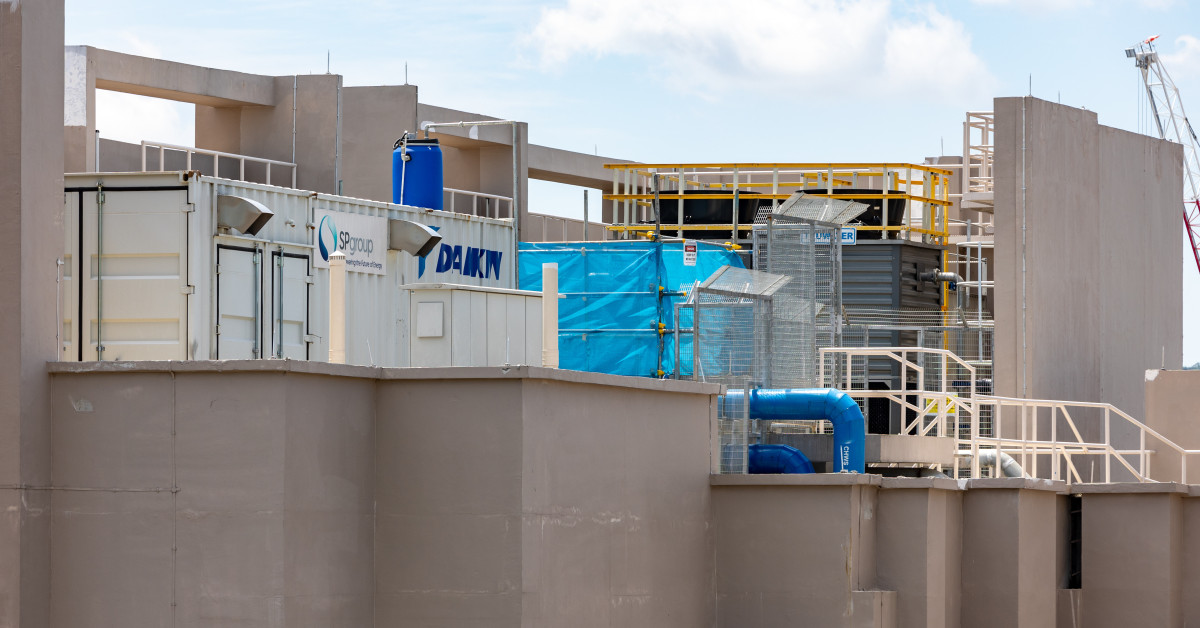CCS woes spur Tengah residents to seek legal recourse against SP Group
When the Tengah eco-town estate was launched over six years ago, it was touted as a “forest town” with green, sustainable and smart features — one of which was the debut of the central cooling system (CCS), the first to be offered in a public housing estate.
Initial marketing material for the CCS stated that the system was eco-friendly and efficient. It uses centralised condensers to pipe chilled water as the main coolant. Cost savings of 30% were advertised for the CCS compared to conventional air conditioning.
However, teething issues arising from the implementation of Tengah’s CCS have led some residents who have moved in to seek legal recourse against SP Group, the company tasked with building, designing and implementing the CCS across the estate.
Read also: MOE relocates Kranji Primary School to Tengah and Outram Secondary to Sengkang
Advertisement
Advertisement
A Telegram chat group, “Tengah CCS Issues”, conducted a poll to gauge the intentions of its 3,000 members. It found that out of 500 respondents, 21 (4.2%) said they have opened a case with the Small Claims Tribunal (SCT). Another 92 (18.4%) indicated intentions to do so.
Of the 21 respondents who claimed to have opened cases, four responded that they were successful in their cases against SP, three responded that they were not, and the remaining cases were ongoing.
Several respondents shared with EdgeProp Singapore that one of the main reasons they were pursuing legal recourse was a lack of faith that SP would make good on its initial promises for the CCS. Therefore, they are seeking to cancel their contracts with minimal financial losses.

As of July 22, the MyTengah.sg website by SP Group still quotes the outdated cost-saving estimates from November 2023 (Source: SP Group/MyTengah website)
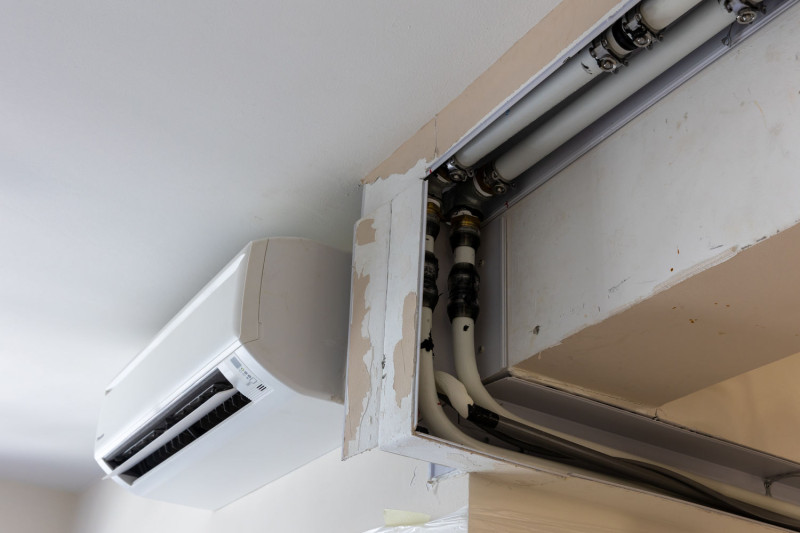
The majority of complaints about the system stem from water condensing or leaking from the piping. (Credit: Samuel Isaac Chua / EdgeProp Singapore)
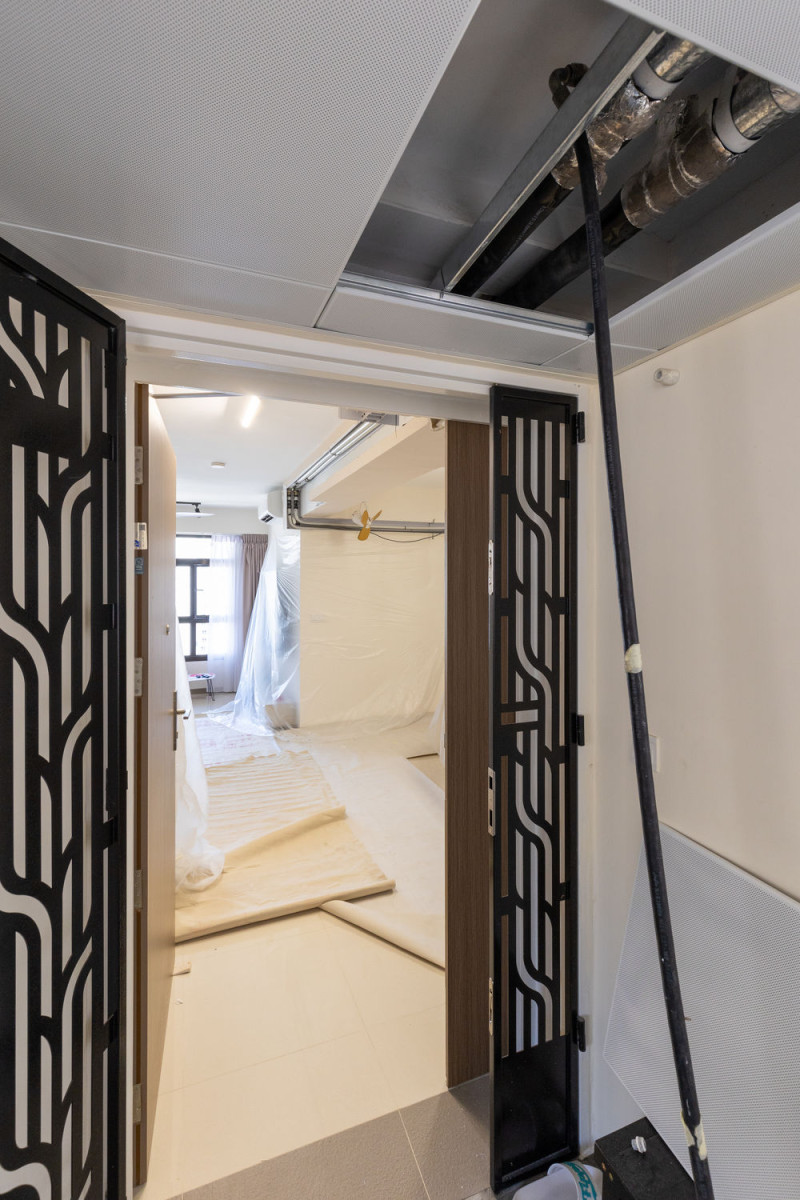
CCS testing being conducted at a completed unit in Tengah following the detection of leaks six months after moving in (Credit: Samuel Isaac Chua / EdgeProp Singapore)
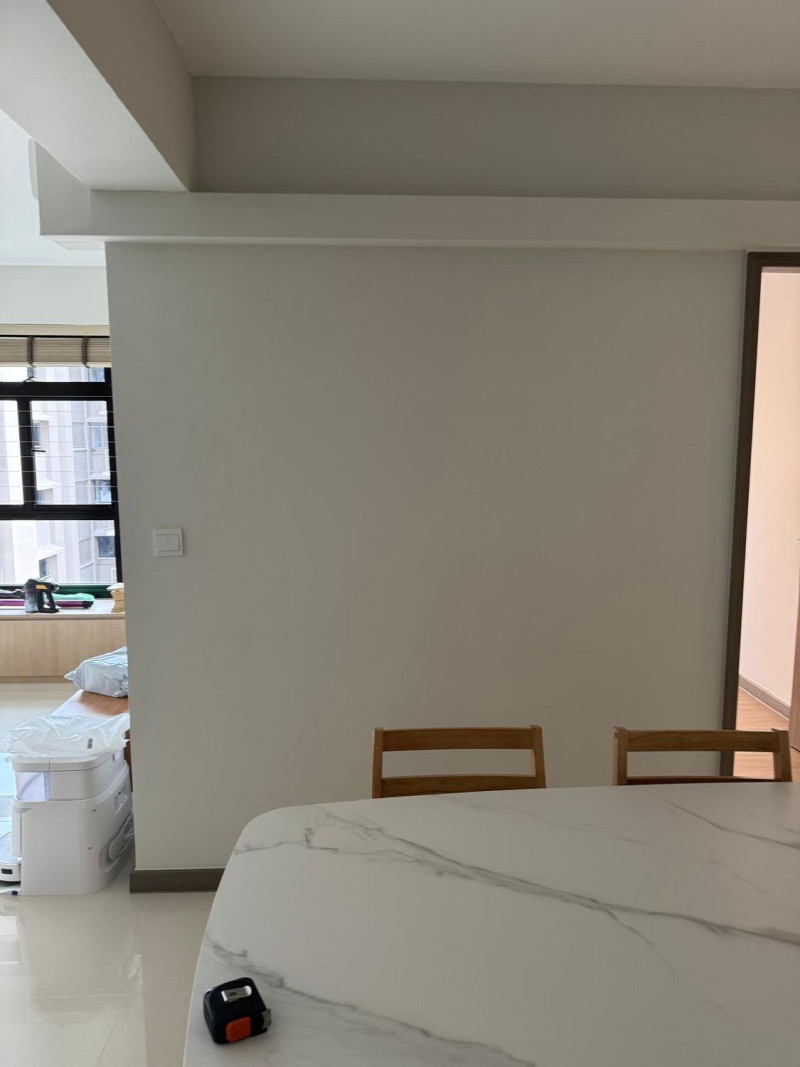
Pang advises CCS subscribers to avoid hiding or covering the coolant pipe's trunking to better detect faults (Photo: Russell Pang / Kinjo)
Pang also avoids hiding or covering the coolant pipe’s trunking in the five units he renovated. He explains that it allows homeowners to identify and remedy leaking or condensation issues in the future.
“The CCS is a brilliant idea,” says Pang. Like any new feature, it has teething issues, he concedes. However, he is confident that they will be ironed out.
An example is the new open-concept layout offered at the upcoming October launch of the Kallang-Whampoa Build-To-Order flats. “Without additional support beams, air-conditioner piping may be even more prominent without a false ceiling,” explains Pang. However, he is “cautiously optimistic” that the issue will be resolved.
Editor’s note: The author of the article is a future resident of the Tengah estate. He has opted to install the CCS in his future home.
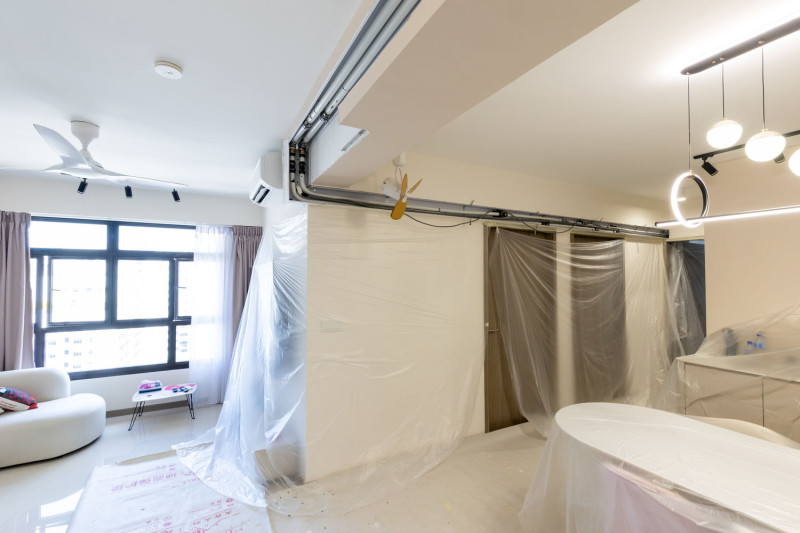
Newly completed HDB flats are covered by a one-year Defects Liability Period effective from the date of key collection (Credit: Samuel Isaac Chua / EdgeProp Singapore)

Early birds
A Tengah resident who only wants to be known as Mrs Tan has an ongoing case and recounts why she signed up for the CCS in 2020. “The system was eco-friendly, cost-saving, and we wanted to support the new idea,” says Tan. “It didn’t matter that we signed up years before actual implementation because we believed that an established organisation like SP would execute it well.” However, her issues with the CCS and SP started soon after she signed her contract. Tan says: “I wanted to shift my fan coil unit,” a point she claims to have brought up in initial conversations with SP’s sales representatives before signing her contract. Read also: [UPDATE] Copen Grand fully sold, with remaining units snapped up by second-time buyers Advertisement Advertisement But after signing, she was told that the system could not accommodate the shift. She attempted to resolve the issue with SP for over a year before requesting that pre-installation works for her unit be put on hold.
Penalties for termination
Photos and videos of pooling water caused by the CCS began to flood the “Tengah CCS Issues” chat group on Sept 22, 2023, following the completion of the first batch of flats in the estate. Shortly after, SP released a statement on Nov 6, 2023, revising its initial cost-saving estimates from 30% to 17%, citing an increase in electricity costs. SP also announced multiple measures to reassure residents in its November 2023 statement, including additional quality checks, waiving CCS usage charges, halving the contract cancellation fee and resolving 88% of reported issues. However, in light of her previous experience with SP, Tan decided to cancel her contract. Terminating her contract in December 2023 incurred a cost of $796.25, or 17.5% of her total installation charge. Her unit was five months from being completed. Currently, residents who cancel their CCS contract agreement before their fan coil units, piping and cabling are installed incur a penalty equal to 17.5% of the total installation charge. The penalty increases to 50% if the contract is cancelled after installation works are completed. Contracts cancelled within the 30-day cooling-off period from signing incur no cancellation charge. Read also: Copen Grand EC receives 2,300 e-applications Advertisement Advertisement According to the contract agreement issued by SP, the amount reflects a “genuine pre-estimate of the loss” suffered by the company due to the contract’s cancellation.
Claims and counterclaims
Court documents seen by EdgeProp Singapore show that at least one resident has successfully dismissed SP’s claim of loss incurred from customers cancelling their contracts. The resident, who only wants to be known as Maan, is a construction project manager in his 50s. He succeeded in dismissing SP’s claim of damages incurred during his SCT hearing in February. Like Tan, Maan cancelled his CCS contract after the system did not allow the coolant pipe in his unit to be rerouted to accommodate his renovation plans. Maan claims that a sales representative from SP assured him that he could void the contract without repercussions in such cases. Yet SP informed him that he was still liable for the cancellation fee after cancelling the contract. Without evidence of the verbal exchange between himself and the sales representative, Maan filed a claim against SP with the SCT. In response, SP filed a counterclaim. “I’m not sure why I even filed the claim,” says Maan, as he had not yet paid the cancellation fee at that point and, thus, could not prove that he suffered a loss. But to his surprise, neither could SP. SCT records showed that SP’s counterclaim was dismissed. “When we were asked to produce evidence, SP didn’t submit anything,” recounts Maan. “I think that’s why the magistrate dismissed its claim.”‘Refuse to pay’
Since sharing his experience on the Telegram group, Maan estimates that up to 15 other residents reached out to him for advice on how to proceed with their own claims against SP. However, he has not heard of SP filing another counterclaim since his case. Other residents who have filed with the SCT claim that their cases were dismissed out of hand when they could not prove loss and are still on the hook for the termination charge. Consequently, a future resident of Tengah’s Park District, a multimedia designer in his 20s who only wants to be known as Jay, has decided not to pay the cancellation fee and wait for SP to file an SCT claim against him. A common notion among those in the Telegram chat group is that the SCT will interpret the payment of the cancellation fee as a settlement and throw out the case. “At the moment, we just refuse to pay and see how it goes,” says Jay. “I think there will be fewer people intending to go the SCT route now since there are many stories of cases being thrown out.”More than 9,000 CCS subscribers
As of Feb 12, SP reported having more than 9,000 CCS subscribers in Tengah, equal to about 70% of residents who have signed leases for HDB flats there. SP has also stated that they aim to resolve all reported issues within 10 business days of the initial inspection. In response to a request for comment from EdgeProp Singapore, an SP spokesperson said: “SP Group, together with our partners, are committed to delivering a reliable, energy-efficient, and cost-effective CCS. Our round-the-clock operations and customer support teams remain ready to respond to customer queries and assist them with timely support.”‘Brilliant idea’
Russell Pang, co-founder of local interior design firm Kinjo, has renovated five HDB flats in Tengah. All five had subscribed to the CCS. “Of my five projects, three units experienced issues with leaking and condensation before renovations began,” says Pang. “Technicians from SP Group responded within two to three weeks at no additional cost to the homeowners.” He has not heard of CCS issues arising in his projects since. Based on his personal experience and conversations with other interior designers who have done renovations in Tengah, Pang believes that instances of CCS faults severe enough to require rectification works after renovation are “quite rare”. He also shares that there are preventative measures to minimise such cases. “I advise my clients to thoroughly test their CCS units and report any issues before renovation works,” says Pang. “This way, any leakages can be remedied before affecting renovation works.” Newly completed HDB flats are also covered by a one-year Defects Liability Period effective from the date of the key collection. Defects can be reported to the Building Service Centre within the estate for rectification works.

